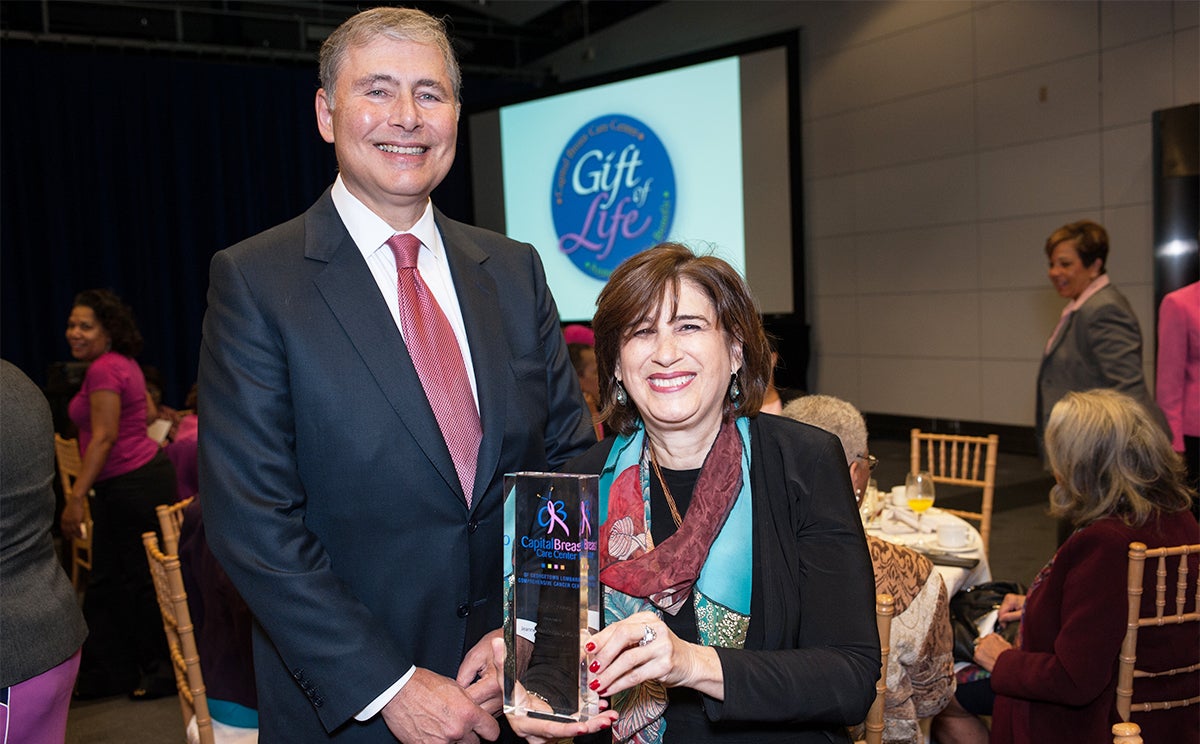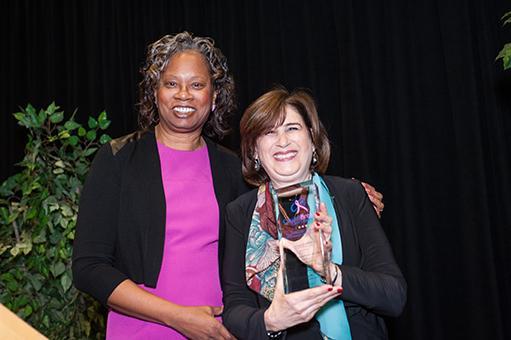Capital Breast Care Center Highlights Accomplishments and Advocates at Gift of Life Breakfast

Posted in Lombardi Stories | Tagged Gift of Life Breakfast, health disparities, philanthropy, Ralph Lauren Center for Cancer Prevention
October 28, 2015 — At its 8th Annual Gift of Life Breakfast, Capital Breast Care Center (CBCC) and its supporters recognized the incredible strides made by the organization, as well as the continued need for a strong community.
Founded in 2004, CBCC provides health education and breast cancer screening services to women in the Washington, D.C., metropolitan area, regardless of their ability to pay. Part of the Office of Minority Health and Health Disparities Research at Georgetown Lombardi Comprehensive Cancer Center, its services include free mammograms, transportation to and from screening appointments and patient navigation through outreach, screening and diagnosis.
The event attracted over 200 advocates with a shared commitment to empowering local women and ensuring equal access to health care.
Evening the Odds
Louis M. Weiner, MD, director of Georgetown Lombardi, began the ceremony by reminding attendees of the importance of CBCC’s mission.
“Washington, D.C., has the highest rate of breast cancer mortality in the nation,” he said. “That is unacceptable. I’m here today because I don’t ever want to see another woman or man die of breast cancer. I’m proud to celebrate the incredible accomplishments of CBCC, and I assure you: you haven’t seen anything yet.”
CBCC program director Tesha Coleman also highlighted the need to address the persistent health disparities in breast cancer diagnosis and treatment.
“Minority women, specifically low-income women, face numerous barriers to screening,” she said. “These are barriers that lead to late-stage diagnosis and perpetuate disparities between racial and ethnic groups. Programmatic improvements allow us to reach women most in need. CBCC is unique in the compassionate care we provide to every woman we encounter.”
Coleman illustrated her point by sharing stories of women who were able to overcome obstacles to screening because of the help of CBCC patient navigators. The center thrives off the empathy of its dedicated staff, she said, and every staff member goes above and beyond, comforting a woman with anxiety, accompanying another on public transportation and working together to create a supportive environment.
CBCC certainly made a tremendous difference in the life of one woman, Valerie, who was diagnosed in 2014 and reached out to CBCC, where she received the very assistance she needed. She thanked the center in a pre-taped video.
“You all have helped me in so many ways with support and referrals. I don’t know that I would be sitting here talking to you if not for all your help. I didn’t have to go anywhere else – CBCC was right there.”
Yvette Alexander, DC council member and chair of its Committee on Health and Human Services, saluted survivors in the room and acknowledged the importance of advocacy at the government level.
“I’m committed to doing everything I can in allocating funds and implementing policy to further advances in research and treatment and ultimately find a cure,” she said.
A Founder, a Keeper
This was the first year that CBCC bestowed the Founders Award, an honor given to the center’s founding director, Jeanne Mandelblatt, MD, MPH. Lucile Adams-Campbell, PhD, associate director of Minority Health and Health Disparities Research, presented the award after detailing how Mandelblatt has been instrumental in the organization’s success.

In 2003, Mandelblatt took charge in writing the first proposal that ultimately led to a $1.5 million grant from the Avon Foundation to start CBCC. Her vision included a culturally competent and multilingual staff, so that the community-based center could reach the women who need help the most.
“It is very humbling to be honored in this way,” said Mandelblatt. “I want to thank you all for carrying the vision we started with forward. I’m grateful to see CBCC so vibrant, alive and in the hands of such wonderful men and women.”
Mandelblatt is also responsible for creating the CBCC Georgetown Lombardi team for the Avon Walk for Breast Cancer, a two-day, 39.3-mile trek that raises money for breast cancer research. With her as captain, the team was the top fundraiser in the region this year, amassing $248,000. Though she’s completed 15 Walks so far, she has no plan to stop anytime soon.
“I will walk as long as we still have not cured breast cancer,” she said. “The team motto is ‘no one walks alone.’ That is present in the spirit of CBCC as well – that no woman who seeks treatment is alone. We are all there as a community to help each other.”
Survivors and Support Givers
Keynote speaker Marc Heyison noted the essential role of family in supporting women during their fight against breast cancer. Seven years after his mother was diagnosed with the disease in 1992, he founded Men Against Breast Cancer, the first and only national nonprofit dedicated to empowering men to be effective caregivers. In addition to stressing the lifesaving power of early detection, he shared his conviction that men and women are “partners in survival.”
“What’s more natural than being there for somebody?” Heyison asked. “If we don’t do it, who else is going to do it? You only need to make a difference to one person.”
Andrea Roane, WUSA-9 Anchor and Mistress of Ceremonies for the breakfast, took a moment to acknowledge Valerie in the audience before closing the program with a call to action.
“CBCC plays a vital role in the lives of women throughout Washington, D.C., Virginia, and Maryland,” Roane said. “We’ve heard the stories. We’ve seen the outcomes. We know about the challenges. With your support, Capital Breast Care Center can continue to provide screening services, education and transportation to women who are often overlooked.”
Meghan Lasswell
GUMC Communications
